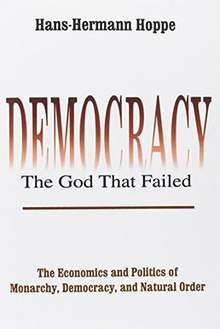Democracy: The God That Failed
Democracy: The God That Failed is a 2001 book by Hans-Hermann Hoppe, containing a series of thirteen essays on the subject of democracy. The book "examines modern democracies in the light of various evident failures" which, in Hoppe's view, include rising unemployment rates, expanding public debt, and insolvent social security systems. He attributes democracy's failures to pressure groups seeking increased government expenditures, regulations and taxation and a lack of counter-measures to them. He discusses as solutions secession, "shifting of control over the nationalised wealth from a larger, central government to a smaller, regional one" and "complete freedom of contract, occupation, trade and migration introduced".[1] It concludes that democracy is the primary cause of the decivilization sweeping the world since World War I, and that it must be delegitimized.
 Cover of the first edition | |
| Author | Hans-Hermann Hoppe |
|---|---|
| Subject | Democracy |
Publication date | 2001 |
| Media type | Print (hardcover and paperback) |
| Pages | 304 |
| ISBN | 978-0765808684 |
Hoppe characterizes democracy as "publicly owned government", which he compares to monarchy—"privately owned government"—to conclude that the latter is preferable; however, Hoppe aims to show that both monarchy and democracy are deficient systems compared to his preferred structure to advance civilization—what he calls the natural order, a system free of both taxation and coercive monopoly in which jurisdictions freely compete for adherents. In his Introduction, he lists other names used elsewhere to refer to the same thing, including "ordered anarchy", "private property anarchism", "anarcho-capitalism", "autogovernment", "private law society", and "pure capitalism".[2]
The title of the work is an allusion to The God that Failed, a 1949 work in which six authors who were former communists (or former communist sympathizers) describe their experience of and disillusion with communism.
Reception
Walter Block gave the book a generally favorable review. He concludes, "This book will take by storm the field of political economy, and no one interested in these topics can afford to be without it."[3]
Publishing history
English
- Transaction Publishers, Rutgers, N.J., 2001: Hardcover: ISBN 0-7658-0088-8.
- Transaction Publishers, Rutgers, N.J., 2001: Paperback: ISBN 0-7658-0868-4.
German
- Hardcover: ISBN 3-933497-86-8.
Italian
- Cloth: ISBN 88-85140-77-7.
Korean
- Hardcover: ISBN 89-300-8022-7.
- Paperback: ISBN 89-300-8001-4.
Spanish
- Cloth: ISBN 84-933774-0-6.
Polish
- Warsaw, 2006: ISBN 83-89812-21-5.
References
- R.M. Pearce, Book Review: Democracy: the God That Failed, National Observer (Australia), No. 56, Autumn 2003.
- Hans-Hermann Hoppe, Introduction to Democracy, The God That Failed, reprinted at Ludwig von Mises Institute website.
- Block, Walter E. (2002). "Democracy: The God that Failed: A Review". American Journal of Economics and Sociology. 61. SSRN 1946360. American Journal of Economics and Sociology No. 3.
External links
- Introduction to Democracy: The God That Failed
- World War I as the End of Civilization, (MP3 file) a lecture by Hoppe on the same subject.
- "Democracy: The God That Failed", an essay of the same title, also by Hoppe
- English preface to the Polish edition (in PDF format)
- An extract of Chapter Nine, "The Rise and Fall of the City"
- Link to list of reviews of the 2001 edition
